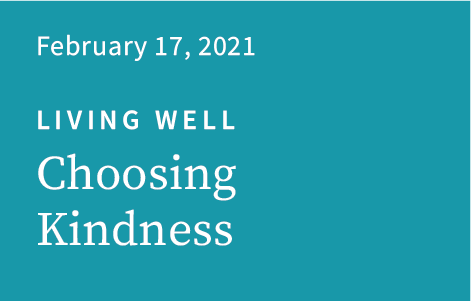Transcript
Choosing Kindness
Hi, I’m Alex Morris, and over decades of experience as an Alzheimer’s care coach, I’ve seen that caregivers can have a difficult time keeping up with their loved one’s changes. It requires a change in the way we approach our loved ones, as well as a new set of skills rooted in kindness and compassion that I’d like to share with you today.
Not long ago, I spoke with a client named Mary, whose sister had moderate-stage Alzheimer’s and had just moved to an assisted living facility. At each visit, Carol would ask about her house and her things. She was a long-time collector, and her house was packed with beloved objects. Mary told her the truth: The house was being sold to pay for her care, and her possessions were being given away or sold. Carol reacted with great anxiety, and the visits and calls would end badly—with Carol’s distress and confusion sometimes lasting for days.
While at one time the sisters were able to have honest conversations, the person Mary had known most of her life was now different. It wasn’t Carol’s fault; it was her illness. Carole had changed, but Mary’s way of communicating with her had not. Clearly, it didn’t work for Mary to treat Carol the same way she always had.
If telling Carol the truth caused so much pain, then what could be done to ease it?
My answer is: First and foremost, be kind. If we can be truthful without being unkind, great. But if we can’t tell the truth without causing pain, we should choose kindness.
Being kind to Carol meant telling her what she needed to hear, that the house was fine and her things were untouched. In short, to lie. But Mary would not lie. The sisters had made a pact long ago never to lie to each other, and she felt she should never break it. However, things had changed. Today’s harsh reality was that telling her sister the truth caused Carol great distress. Mary was hanging on to an outdated idea of Carol. In the end, Mary was serving herself, not helping Carol. It took Mary a while, but changing her approach helped relieve her sister’s distress and improve their relationship.
Let me say again: If you can’t be both truthful and kind, please choose kindness. Don’t use the word “lie” in your head, but instead think, “What answer can I give right now that will help this person? What is the kind thing to do?”
There may be a reason that prioritizing kindness over facts can be so effective. With dementia, the cognitive function may decline, but emotional memory often remains very much intact. Even when people with dementia can’t remember the content of a conversation, or the conversation at all, they will remember how you made them feel.
Susan had moderate dementia, and her sister told her that a beloved brother was very ill and might die soon. When I arrived for my visit, Susan was crying and wailing over and over, “The man is sick. The man is dying.” I didn’t know who “the man” was, but clearly the narrative had to change quickly.
I took her hands and looked into her eyes and said calmly, “Good news, the man is better.” She said, “How do you know?”and I replied, “I spoke with your family. So please don’t worry as everything is better now.” Then I added, “You are all right.Let’s celebrate with some Baskin Robbins ice cream.”
Susan’s situation is a good example of a few skills I put into practice.
First, as mentioned earlier, when you can’t be truthful, be kind. Susan could not process her brother’s illness, and it caused her enormous distress. I chose to be kind and say he was better.
Second, folks with dementia tend to respond to emotional content. She was anguished because of her strong emotional connection with her brother—which is also why being kind, an emotional strategy, was effective.
Third, be reassuring, and move quickly on to something pleasant. I told Susan, “You’re all right.” I ended with an offer of ice cream because I knew she loved Baskin Robbins. You can change the tone of the conversation from distress to celebration.
Finally, remember to keep your words short. Literally count them. More than ten words at a time usually is counterproductive. “Good news, the man is better.” Six words. “You’re all right.” Three words.
Words of explanation should be short—but words of love, praise, reassurance, joking, and kindness can overflow.
It’s not always easy to reroute a conversation. Your strategy should always come back to: What will he or she respond to, what will make emotional sense to my loved one? Here’s a common example.
It’s no longer safe for your dad to drive. But he thinks he’s just fine. You have to break the news that he can’t. Because driving is important to people, this conflict is likely to come up repeatedly.
One option is to try to deliver the truth in a kind way: “Dad, I am so sorry but you can’t drive anymore. The DMV took away your license.” It may work. If it results in anger, even an argument, you know that next time you should have a few different approaches ready. In this situation, I asked the caregiver, “What does your dad value? Is he the type to help others? Is there a family member who needs a car right now?” The answers were all “yes”—a beloved grandson had just graduated from college and was in need of a car.
So the next time driving came up, the caregiver could emphasize emotional gratification, with something like, “Oh, I’m so happy you could give Steve your car. He’s thrilled! It was so kind and generous of you, Dad. You’re the best.” Words of love, praise, reassurance, and kindness overflowing.
Hard to believe, but it worked—and it worked every time Dad asked for the car.
I want to acknowledge that it’s not always easy. But often it’s not as hard as we feared if we are willing to be creative and try different approaches—always aiming for the kind response.
As with anything you want to be more proficient at, you must practice. Practice with other family members, friends, in front of a mirror. Then you should be ready for the words to come out smoothly and with sincerity.
Your words may not always be factually true, but the intentions and sentiments will be sincere. When you speak from the heart, when you choose kindness and connect to an emotional truth, it’s your sincere attempt to help your loved one and you live your best possible lives.
Alexandra Morris
Geriatric Care Manager

